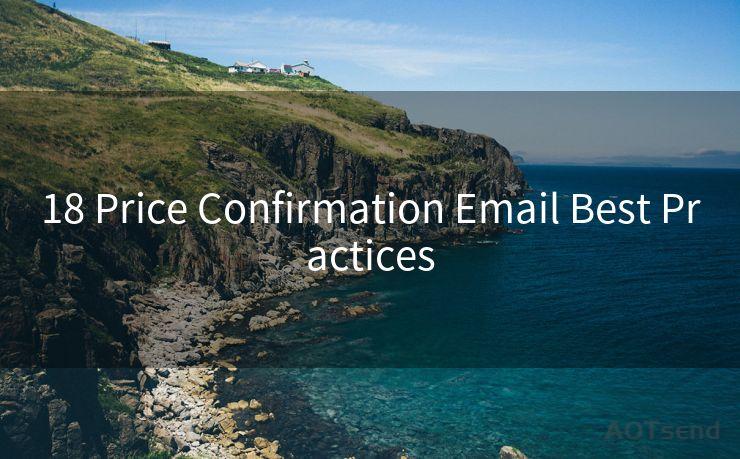18 Price Confirmation Email Best Practices




When it comes to online transactions, the price confirmation email is a crucial touchpoint between businesses and customers. It not only confirms the transaction details but also sets the tone for the post-purchase experience. Here are 18 best practices for crafting effective price confirmation emails that enhance customer satisfaction and foster brand loyalty.
1. Clear Subject Line
Start with a clear and concise subject line that immediately informs the recipient that this is a price confirmation email. For example, “Your Order Confirmation #12345” or “Price Confirmation for Your Recent Purchase.”
2. Professional Design
Ensure your email template is professionally designed, with a clean layout and easy-to-read font. Use your brand’s color scheme for consistency.
3. Order Details
Include all the relevant order details such as order number, product name, quantity, price, and total amount. This helps the customer verify the accuracy of their order.
4. Payment Confirmation
Confirm the payment method used, the amount paid, and the status of the payment. This adds transparency and builds trust.
5. Shipping Information
Provide estimated shipping dates, tracking information (if available), and any special instructions related to shipping.
6. Contact Information
Include your customer service contact information, such as email, phone number, or live chat options, in case the customer has any queries or concerns.
7. Return Policy
Briefly outline your return policy or provide a link to the detailed policy on your website. This gives customers peace of mind and confidence in their purchase.
8. Thank You Message
Always express gratitude to the customer for their purchase. A simple “Thank you for your order!” goes a long way in fostering positive feelings about your brand.
9. Upsell or Cross-Sell
Consider including related products or services that the customer might be interested in. However, be careful not to overdo it, as this can be perceived as pushy.
10. Social Media Links
Encourage customers to connect with your brand on social media by including links to your profiles. This helps build your online community and keeps customers engaged.
11. Feedback Request

Ask customers for feedback on their purchase experience. This valuable information can help you improve your services in the future.
12. Security and Privacy
Reassure customers about the security of their personal information and the steps you take to protect it. This is especially important in the age of data breaches and cybercrime.
13. Mobile-Friendly Design
Ensure your email is optimized for mobile devices. Many customers check their emails on the go, so a mobile-friendly design is crucial.
14. Avoid Spam Filters
Use appropriate email marketing practices to avoid getting caught in spam filters. This includes avoiding excessive use of capital letters, exclamation points, or spammy words in your subject line and email body.
15. Call to Action
Include a clear call to action (CTA) at the end of your email, such as “Visit Our Store” or “Share Your Feedback.” This guides the customer on what to do next.
16. Testing and Optimization
🔔🔔🔔
【AOTsend Email API】:AOTsend is a Managed Email Service for sending transactional emails. Support Email Types: reminders, authentication, confirmations, notifications, verification codes, invoices, password resets, account activations, billing statements, two-factor authentication (2FA), and one-time passwords (OTP) emails, etc. $0.28 per 1000 Emails. 99% Delivery, 98% Inbox Rate.
You might be interested in:
Why did we start the AOTsend project, Brand Story?
What is a Managed Email API, How it Works?
Best 25+ Email Marketing Platforms (Authority,Keywords&Traffic Comparison)
Best 24+ Email Marketing Service (Price, Pros&Cons Comparison)
Email APIs vs SMTP: How they Works, Any Difference?
Regularly test and optimize your confirmation emails to ensure they are performing well. Use A/B testing to compare different versions and see which one resonates better with your audience.
17. Personalization
Use the customer’s name in the email and consider tailoring the content based on their purchase history or preferences. Personalization makes the email feel more relevant and engaging.
18. Timely Delivery
Ensure that the confirmation email is sent immediately after the purchase is made. This timely communication reinforces the customer’s decision and starts the post-purchase relationship on a positive note.
By following these 18 best practices, you can craft price confirmation emails that not only inform but also delight your customers, leading to increased satisfaction and loyalty. Remember, every interaction with your brand is an opportunity to build or strengthen the relationship with your customers. Make the most of it with thoughtful and well-designed confirmation emails.




Scan the QR code to access on your mobile device.
Copyright notice: This article is published by AotSend. Reproduction requires attribution.
Article Link:https://www.mailwot.com/p2966.html



